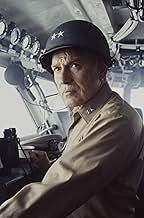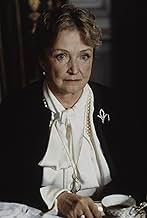Füge eine Handlung in deiner Sprache hinzuThe trials of the Henry and the Jastrow families amidst the events after the U.S.'s entry into World War II.The trials of the Henry and the Jastrow families amidst the events after the U.S.'s entry into World War II.The trials of the Henry and the Jastrow families amidst the events after the U.S.'s entry into World War II.
- 3 Primetime Emmys gewonnen
- 12 Gewinne & 19 Nominierungen insgesamt
Empfohlene Bewertungen
Shot on location around the world, the soap opera stories are always intriguing as we follow the various members of the Henrys, an American Naval family as they encounter every major event of the war.
The heart, though, is the central plot of Jane Seymour, in a heartbreaking career-best performance as an American Jew trapped in Europe, and John Gielgud, mesmerizing as her uncle. As they are slowly, inexorably pulled into the Holocaust we follow them, step by agonizing step, to the final horrors of Auschwitz, filmed entirely on location.
The movie is aided by a brilliant, unforgettable score by Bob Cobert, especially the main theme which seems to encapsulate every single emotion of the thirty hours into its two minutes.
It may be a bit of a commitment to watch this, but it is worth it. "War and Remembrance" is as close to time travel as is possible, and makes that dark period of history come powerfully alive.
"War and Remembrance" revolves around the lives of two families, the Henrys and the Jastrows. The connection between them is provided through the marriage of Byron Henry and Natalie Jastrow. The Henrys are a naval family: Victor "Pug" Henry serves both as a diplomat and as the commander of a destroyer at various times in the series, Byron Henry serves on a submarine in the Pacific, Warren Henry is a naval pilot married to the daughter of a Senator. Byron's wife, Natalie Jastrow is an American Jew in Europe trying to escape the Nazis along with her uncle, Aaron Jastrow, and her son with Byron, Louis Henry. Aaron Jastrow's cousin is a Jewish Polish soldier trying to survive Auschwitz. Those are just some of the characters whose stories captivate the audience. There are also the experiences of their spouses, lovers, and the relatives of their spouses and lovers.
The audience is also given a glimpse into the thinking of the Nazi leadership, with Steven Berkoff providing a chilling and brilliant portrayal of Adolf Hitler. Here was a look at the Holocaust and the events and decisions leading up to it that was unprecedented at the time that the series debuted in 1988.
It is unfortunate that I have not found many libraries that carry copies of this miniseries on either VHS or DVD, forcing many people to either buy it or miss out on experiencing it. I, for one, have chosen to buy it, and I do not regret it for a day. I also recommend reading the book.
Of course, having John Gielgud in the cast didn't hurt! He was absolutely marvelous. I can only say that the entire story arc concerning Gielgud and his family was remarkable. The scene where Natalie eats the apple brought to the cattle cars by the Christians was incredible, as was the entire cattle car saga. The concentration camp scenes, the depiction of the commandant and his family, the entire cover-up aided and abetted by the Red Cross, Natalie's will to survive and be reunited with her son -- they are etched in my heart and will stay there forever.
I heartily recommend this miniseries. Look for it on History Channel to get the commentary. This was superior work by Dan Curtis.
Many of my students have told me that seeing this series changed their view and motivation of the importance of historical knowledge and the passing of it from generation to generation. They have even formed outside discussion groups because the allotted class time is never enough to accommodate the forum required for voicing and digesting their thoughts and feelings brought on by the film. This is a film for the ages.
I loved the documentary style in which they told this story. The only thing I didn't like about this series was that the bombing of Hiroshima seemed to be glossed over in the end. It was like an "Oh, by the way..." thing. A brief comment about the war being over, and on to look for the kid. Such an important moment in the movie--and history--deserved more attention than it got. But I guess at that point, they were in a hurry to finish the thing because it was eighteen hours long as it stood. Except for the hurried ending, it was a great series.
Wusstest du schon
- WissenswertesThe series performed disappointingly in terms of viewing figures compared to Der Feuersturm (1983).
- PatzerGeneral Arnim von Roon's rank changes up and down throughout the mini-series. In June 1942, the narrator announces him as Major General von Roon. In later episodes in 1944 and 1945 he is demoted to the rank of Brigadier General. No German generals were ever demoted, even when falling out of favor with Hitler.
- Zitate
Capt. Victor 'Pug' Henry: [translates for Pamela his Russian comment] I just told him that we were good friends - that's all.
Gen. Yevlenko: You are in Moscow dear lady because HE got you a visa. Henry... nebu durakom.
[Laughs uproariously]
Gen. Yevlenko: . Nebu durakom! NEBU DURAKOM!
[exits]
Pamela Tudsbury: "Nebu durakom..." Don't be... what? What's "durakom"?
Capt. Victor 'Pug' Henry: "Damned fool".
- VerbindungenEdited from Dreißig Sekunden über Tokio (1944)
Top-Auswahl
- How many seasons does War and Remembrance have?Powered by Alexa
- I just watched this. I didn't think they could show the nudity from the concentration camps on network television. Apparently this aired on ABC. How did they get this past the censors?
Details
- Erscheinungsdatum
- Herkunftsländer
- Sprachen
- Auch bekannt als
- War and Remembrance
- Drehorte
- Produktionsfirmen
- Weitere beteiligte Unternehmen bei IMDbPro anzeigen
Zu dieser Seite beitragen








































